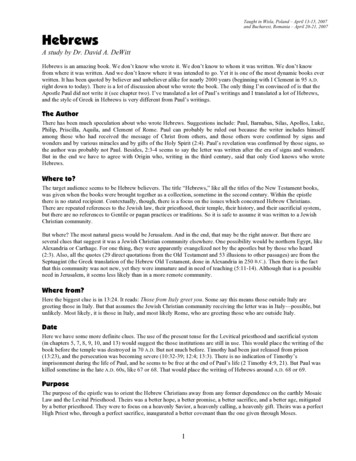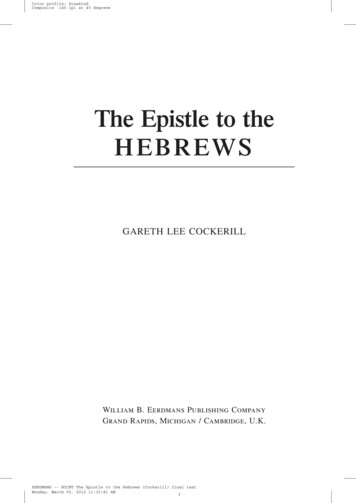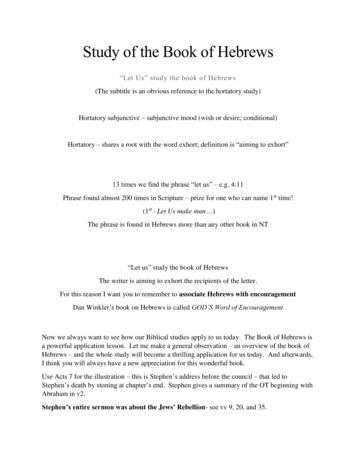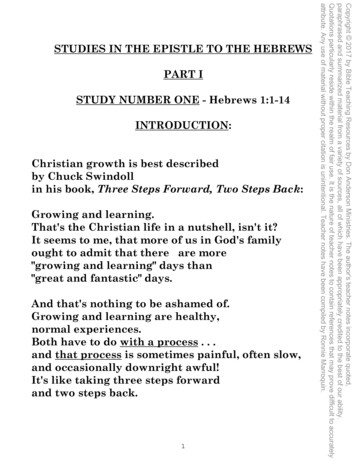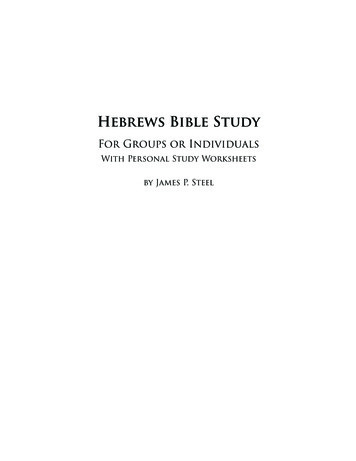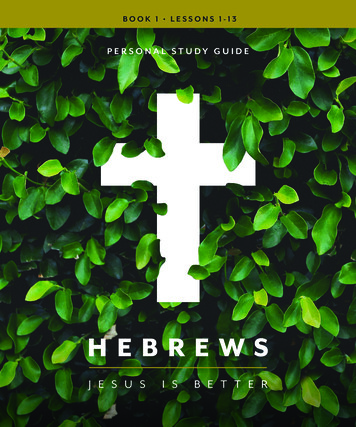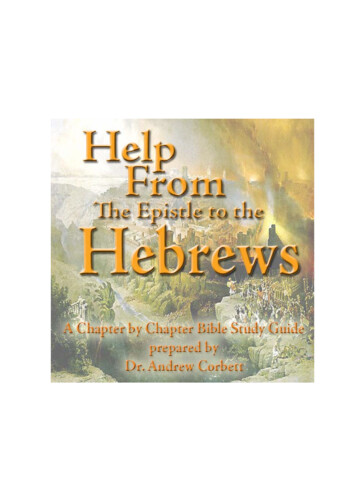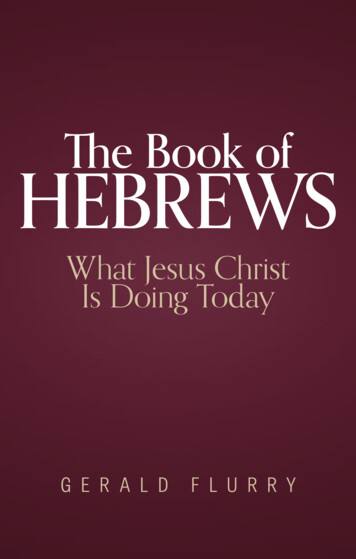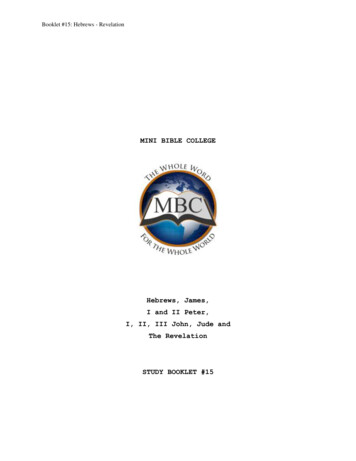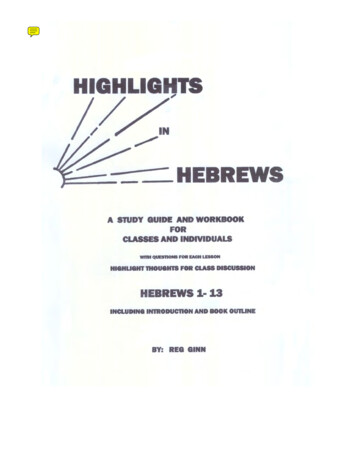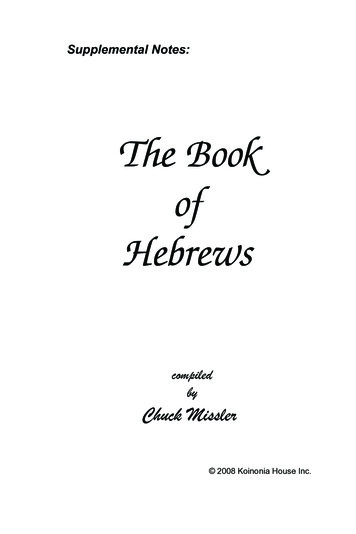
Transcription
Supplemental Notes:The BookofHebrewscompiledbyChuck Missler 2008 Koinonia House Inc.
Audio ListingHebrews Introduction and 1:1 - 3Introduction. Authorship.Hebrews Chapters 1:4 - 14Greater Than the Angels.Hebrews Chapter 2AcknowledgmentsThese notes have been assembled from speaking notes and relatedmaterials which had been compiled from a number of classic and contemporary commentaries and other sources detailed in the bibliography,as well as other articles and publications of Koinonia House. Whilewe have attempted to include relevant endnotes and other references,we apologize for any errors or oversights.The complete recordings of the sessions, as well as supporting diagrams,maps, etc., are also available in various audiovisual formats from thepublisher.The Role of Christ in Salvation. Warning #1: The Danger of Drifting.Hebrews Chapter 3Greater Than Moses. The Disobedient Generation—Warning #2: TheDanger of Disobedience.Hebrews Chapter 4 (and the rest of Chapter 3)The Promise of Rest. Christ, The Way to God.Hebrews Chapter 5Warning Against Apostasy. Priesthood of Melchisedec. Warning #3:Failing to Mature.Hebrews Chapter 6Eternal Salvation Question. Call to Maturity. God’s Oath Unchanging.Hebrews Chapter 7Jesus fulfills the Levitical Priesthood.Page Page
Audio ListingHebrews Chapter 8The Epistle to the Hebrews Session 1Hebrews 1:1- 3The Hebrew Christian EpistlesJesus as the Perfect Priest. The New Covenant.Hebrews Chapter 9The Tabernacle. The Structure. Christ, the ultimate High Priest.Hebrews Chapter 10Not one of the last eight epistles (Hebrews, James, 1 and 2 Peter, 1,2, and 3 John, and Jude) are addressed to a church. These disturbingwarnings seem to contrast with the assurances of the church epistles:Romans 8 vs. Hebrews 6 and 10; Ephesians 2 and Philippians 1 vs. 2Peter 1. These epistles are widely misunderstood—they are not retrograde, but a reach beyond These books also feature a conspicuous Jewish cast:The Significance of the Details. The Camp. “Let us.” The Only Way.The Substance. Warning #4: The Danger of Willful SIn.Hebrews Chapter 11By Faith Abel, Enoch, Noah, Isaac, Joseph. Law versus Grace.Hebrews Chapter 12Warning #5: The Danger of Indifference.Addendum: The Messianic (Millennial) KingdomThe Paradigm of Salvation—Past, Present, and Future Tenses. Sanctification and Inheritance; Paul’s paranoia. Thy Kingdom Come—TheDavidic Covenant an d The Kingdom Events. Overcomers.Hebrews Chapter 13Exhortations. Christian Hospitality. Parting Words.Addendum: Luke 21A review of Luke 21, often confused with the Olivet Discourse (Matthew24 & Mark 13) and the Siege and Fall of Jerusalem in a.d. 70.Page Hebrews: “fathers” and “us.” James: “12 tribes scattered abroad”; Peter: “the sojourners of the dispersion”; etc.There is no mention of the Mystery of the Body of Christ; memberswho have died and risen with Christ; etc; Jews and Gentiles being onenew spiritual organism; nothing of sitting together “in the heavenlieswith Christ.”The Epistle to the HebrewsThis will be a tour de force in Christology and our inheritance as believers(and the risks of forfeiture). It will challenge our soteriology as well asour eschatology—there is more prophecy about the Millennium thanany other period in the Scriptures!One of the two greatest theological treatises in the New Testament:Israel is not a subset of “nations,” but a contrast and a focus. Hebrewsstands as the “Leviticus” of the New Testament and attends even higherground: the distinctives of the Priesthood of Christ vs. the priesthoodof the covenant. The Lord’s priesthood began after He offered Himselfon the cross.In Leviticus the priest only offered what had already been sacrificed(Lev 1:2-5). Aaron did not wear his high-priestly garments until thealready-slain, burnt offering was on the altar (Lev 16:23, 24). ThePassover Lamb was before Aaron was appointed and was offered bythe head of the household, not a Levitical offering! (Ex 24:5, et al.).Page
“Blood of the new covenant”: a once-and-for-all never-to-be-repeatedredemption sacrifice. The Problem: the Temple was still standing inthe way.The Jewish DilemmaThey had a divinely appointed religion, with divinely appointed priestsofficiating in a divinely appointed Temple accomplishing a divinely ordered service, ennobled through the ages.How could believing priestsand Pharisees remain “zealous of the Law”? It was the Jewish religiousworld that crucified Jesus and was repudiating Him.Facing PersecutionThe church in Jerusalem had already had lost Stephen (Acts 7:59,60),James the Apostle (Acts 12:2), and others (Acts 8:1-3, 26:10). Churchesin Galatia (Gal 1:22) were being tempted to resort to (temporary?)apostasy to avoid persecution.Author’s ObjectivesThe author of Hebrews had three main objectives: 1) Combat possibleapostasy (Heb 2:1-4; 10:19-25); 2) Encourage them to press on tospiritual maturity (Heb 5:11-14; 10:32-39); and, 3) Comfort them intheir persecutions (Heb 11:1-12:3).Author’s MethodThe author’s method was the highlight the superiority of the Messiahto the three pillars of Judaism: Angels; Moses; and, the Levitical Priesthood. The contrasts were not between bad and good (both are from God);but between good and better. He deviates from his logical argumentsto include five major warnings.Outline of Hebrews Jesus: The New and Better Deliverer– The God-man: better than the Angels– Warning #1 (of 5)– An Apostle better than Moses– A Leader better than Joshua– Warning #2 (of 5)– A Priest better than Aaron– Warning #3 (of 5)Page Hebrews 1-7Ch. 1, 2Ch. 2:1-4Ch. 3Ch. 4Ch. 3:17-4:13Ch. 5 - 7Ch. 5:11-6:20 A Better Covenant– A Better Sanctuary– A Better SacrificePractical Applications– Warning #4 (of 5)– Hall of Faith– Exhortation to Endurance– Warning #5 (of 5)Hebrews 8 - 10Ch. 9Ch. 10Hebrews 10:18 -13Ch. 10:26-31Ch. 11Ch. 12 - 13Ch. 12:25-29(This traditional fabric of the Epistle misses some of the key points ofthe author. These also tend to be missed by those who fail to see thePauline authorship The readers knew who he was: Heb 13:19, 23 )Christ: The New and Living Way Jesus: The New and Better Deliverer– The God-man: better than the Angels– An Apostle better than Moses– A Leader better than Joshua– A Priest better than AaronCalvary: A New and Better Covenant– Offers better Promises– Opens a better Sanctuary– Sealed by a better Sacrifice– Achieves far better ResultsFaith: The True and Better Response– Parting wordsHebrews 1-7Ch. 1, 2Ch. 3Ch. 4:1-13Ch. 4:14-17Hebrews 8-9Hebrews 10-12Ch. 13Hebrews: the “Riddle” of the NT Authorship “anonymous”: Paul? Apollos? Barnabas?Author had vast knowledge of the OT and was a Hellenistic Jewwriting to Jewish believers who were under much persecution.Issues: The nature of the warnings; To whom written; The dangerspresented for not persevering[Zane C. Hodges, The Bible Knowledge Commentary, Chariot Victor Publishing, Colorado Springs CO 1983, p. 778. FF Bruce, the Epistle to the Hebrews,Wm. B. Eerdmans Publishing Co., Grand Rapids MI 1990, pp. 17-20.]AuthorshipWho wrote the book of Hebrews? Hebrews is an unsigned book. Why?While there are many theories, I do have some strong beliefs, althoughI cannot prove who wrote it.Page
Apollos?Some people feel that Apollos may have written the book of Hebrews.The problem is that there is not much evidence to support the theory.Furthermore, Apollos was from Alexandria, and yet even in Alexandriain the earliest times, the book was associated with Paul. So, if Apolloswas the author, somehow he didn’t even convince his hometown.Priscilla?Others have suggested that it was written by Priscilla, the wife of Aquila, but here again there is no evidence. Timothy is recorded as Paul’samanuensis: Where is the evidence that he was the assistant to any ofthese others?PaulThere are many style reasons that make the epistle “Pauline” in its style.Also, Peter almost states it as a fact:And account that the longsuffering of our Lord is salvation; even as ourbeloved brother Paul also according to the wisdom given unto him hathwritten unto you; As also in all his epistles, speaking in them of thesethings; in which are some things hard to be understood, which they thatare unlearned and unstable wrest, as they do also the other Scriptures,unto their own destruction.2 Peter 3:15-16“.unto you”: Written to Hebrews (1 Peter 1:1; 2 Peter 3:1). Furthermore,Peter calls Paul’s letter Scripture: if Paul wrote an inspired letter to theJews scattered abroad, and that letter has been lost, then a part of God’sinspired, eternal Word has been destroyed; and this is impossible.Ye therefore, beloved, seeing ye know these things before, beware lestye also, being led away with the error of the wicked, fall from your ownstedfastness.2 Peter 3:17The salutation of Paul with mine own hand, which is the token in every epistle:so I write: The grace of our Lord Jesus Christ be with you all. Amen.2 Thessalonians 3:17,18So what is this signature or style item that is included in every letter(Rom 16:24; 1 Cor 16:23-24; 2 Cor 13:14; Gal 6:18; Eph 6:24; Phil4:23; Col 4:18; 1 Thess 5:28; 2 Thess 3:18; 1 Tim 6:21; 2 Tim 4:22;Titus 3:15; Philemon 25)?Paul’s Personal MarkSo how does Hebrews end? “Grace be with you all. Amen.” (Hebrews13:25) Why is this so impressive of Paul’s style? Because the word“Grace” does not even appear in any of the other epistles! (Exceptby Peter, where it is used as an instruction or exhortation and not as asalutation or blessing as here: 2 Peter 3:18)The Love of ChristPeople who have studied the style have determined that, within thestructure of the letters Romans, Hebrews, and Galatians, there is asimilar style: In Romans 8:35-39, Paul lists a number of things that cannotseparate you from the love of Christ. He lists seven things andthen 10 more for a total of 17. In Hebrews 12:18-24 we find a similar list. Again there are seventhings and then 10 more for a total of 17. In Galatians 5:19-21, there is a list of 17 things.Other Style Identities What does that mean? Fall from what? To where?Paul’s Personal MarkWhen one understands that there were apparently forgeries of Thessalonian letters being circulated, then several passages start to makemore sense (2 Thess 2:2). Thus at the end of that letter, Paul includesa sort of private mark, a personal token.Page Paul also uses the Greek word ui oj, huios “sons” rather than a similar Greek word te,knon teknon which other writers use, which means“children.”The doctrine discussed in Rom 8:16 and Heb 10:15 are colinear.The doctrines discussed in 1 Cor 3:13 and Heb 5:12-14 are colinear.The writer says “Pray for us” (Heb 13:18 ). There is only oneepistle writer that makes that statement—none other than Paul.Page
Habakkuk 2:4: “The Just Shall Live by Faith”This verse led to a Trilogy of epistles in NT:The Just.Shall live .By Faith!RomansGalatiansHebrewsRom 1:17Gal 3:11Heb 10:39This implies that Paul wrote all three! Each uses Hab 2:4 as a cornerstone, which became the battle cry of the Reformation.There are reasons in the text that we could infer that the book was probably written after Paul’s first imprisonment, but before his second arrest(Cf Hebrews 13:23). It was clearly written prior to the destruction ofthe Temple in a.d. 70.In fact, the impending destruction of the Temple of Judaism mayhave been one of the reasons that God had Paul show them how theyneeded, as Christian believers, not only to accept Christ, but to comeout of Judaism.And unto the Jews I became as a Jew, that I might gain the Jews; to themthat are under the law, as under the law, that I might gain them that areunder the law; To them that are without law, as without law, (being notwithout law to God, but under the law to Christ,) that I might gain themthat are without law. To the weak became I as weak, that I might gainthe weak: I am made all things to all men, that I might by all means savesome. And this I do for the gospel’s sake, that I might be partaker thereofwith you.1 Corinthians 9:20-23TimothyIn Chapter 13 of Hebrews, there is a reference that the writer of the epistleto the Hebrews was accompanied by Timothy. We know from Scripturethat Timothy accompanied Paul (2 Cor 1:1; Col. 1:1 and 1 Thess 1:1),and we do not have any record of him accompanying anyone else. Whilethat does not mean that Timothy exclusively accompanied Paul, we donot have any evidence of him accompanying any other writer.But the Lord said unto him, Go thy way: for he is a chosen vessel unto me, tobear my name before the Gentiles, and kings, and the children of Israel:Acts 9:15Why Anonymous?So if Paul did write the book, why would he keep it anonymous? Paul’sprimary mission was as the apostle to the Gentiles (Acts 9:15); yet, healso had a deep burden for his brethren. Looking at Paul’s life, we canexpect that he would sooner or later write an epistle to the Hebrews.They were on continually on his heart; yet, when he would try to address them, there were always riots.The Jews were violently prejudiced against his ministry. He was hatedby the Jews because he converted to Christianity, and they reputed hisapostleship and led riots over him (Acts 21:27-28; 22:17-22). They alsofeared his attack against their ancient rituals and ceremonies. He neverrecovered the confidence of the Jewish side; yet was also distrusted bythe Christians because, as Saul, he had persecuted them.Unlike his other epistles, nowhere in the book of Hebrews does Paulassert or defend his apostleship, but instead he builds his entire thesisuniquely from Jewish arguments from Old Testament passages.He exalts Christ, not his own apostleship. It is based entirely on OT(LXX) Scriptures. It was unsigned to eclipse the anti-Pauline prejudicesof Judaizers (even today!). (“Those who say they are Jews and are not,”Rev 2:9; 3:9.)Page 10Of Paul, to Ananias, after the Damascus Road experience Early Church Fathers Clement of Rome, at the end of the first century a.d., copiouslyuses the book of Hebrews, adopting its words just as those of theother books of the New Testament.As our Epistle claims authority on the part of the writer, Clement’sadoption of it extracts from it is sanctioning its authority in thisapostolic age.Clement of Alexandria refers it expressly to Paul, on the author-ity of Pantaenus, chief of the Catechetical school in Alexandria,in the middle of the second century, saying, that as Jesus is termedin it the “apostle” sent to the Hebrews, Paul, through humility, doesnot call himself apostle of the Hebrews, being apostle to theGentiles.[Jamieson, Robert ; Fausset, A. R. ; Brown, David,: A Commentary, Criticaland Explanatory, on the Old and New Testaments. Oak Harbor, WA : LogosResearch Systems, Inc., 1997, S. Heb 1:1.]Page 11
Eusebius, on the “Hypotyposes” of ClementAnd as to the Epistle to the Hebrews, he says that it is Paul’s, but that it waswritten to the Hebrews in the Hebrew language, and that Luke translatedit carefully and published it to the Greeks; that consequently there is foundthe same color, with regard to style, in this Epistle and in the Acts; but thatit is not prefaced by “Paul the apostle” with good reason; “for” (sayshe) as he was sending it to the Hebrews, who had conceived a prejudiceagainst him and suspected him, he very wisely did not repel them at thebeginning by appending his name.Eusebius, Hist. Eccl., 6:14Then he goes on to say, “But,” as the blessed presbyter before now used tosay, “since the Lord was sent to the Hebrews, as being the Apostle of theAlmighty, Paul, out of modesty, as having been sent to the Gentiles, doesnot inscribe himself apostle of the Hebrews, both because of the honordue to the Lord, and because of its being a work of supererogation thathe wrote also to the Hebrews, being herald and apostle of the Gentiles.”Eusebius, Hist. Eccl., 6:14But in the fourth century, Hilary of Poitiers (a.d. 368), Lucifer of Cagliari(a.d. 371), Ambrose of Milan (a.d. 397) and other Latins, quote it asPaul’s; and the fifth Council of Carthage (a.d. 419) formally reckons itamong his fourteen Epistles.The ReadersThey were Jewish. The quotations from the Old Testament settles anargument for a Jewish audience. They were Jewish believers. The maindanger the author warns against is that of going back into Judaism. Theauthor clearly treats them as believers:He calls them brethren (Heb 3:1, 12);He calls them beloved (Heb 6:9);They are partakers of the heavenly calling (Heb 3:1);They are partakers of Christ or the Messiah (Heb 3:14);Certain warnings, such as falling away due to an evil heart ofunbelief and a hardening by the deceitfulness of sin (Heb 3:12 13) are only applicable if the readers are believers; They, like the author, were 2nd generation believers: united bythe us and distinguished from those who were eyewitnesses(Heb 2:3,4); They have been believers for a long time and should now beteachers of the Word (Heb 5:11 - 14); Page 12 Although they have been believers for a long time, they haveremained spiritually immature and have not progressed in thefaith (Heb 5:11–14); The readers are wavering in their faith because of persecution(Heb 10:32 - 38); They are readers who know the author (Heb 13:19, 23).[Fruchtenbaum, Arnold G.: The Messianic Jewish Epistles: Hebrews, James,First Peter, Second Peter, Jude. 1st ed. Tustin, CA : Ariel Ministries, 2005.]The OccasionIt is addressed to a Christian community of considerable size (Heb 13:34);therefore, we assume it was first delivered to Jerusalem (Acts 11:23)or the churches of Judea (Acts 9:31). It was written by someone who hadbeen in bonds (Heb 10:34) and who had been separated from the Jewishbelievers (Heb 13:19). That is why most scholars believe it was writtenby Paul when he was in the hired house in Rome (Acts 28:30).Five Major Warnings The Danger of DriftingThe Danger of DisobedienceProgress toward Maturity(16 different views of Heb 6:4-8)The Danger of Willful SinWarning against IndifferenceHebrews 2:1-4Hebrews 3:7-4:13Hebrews 5:11-6:20Hebrews 10:26-39Hebrews 12:25-29The Unity of the Five WarningsAll five warnings are a unit: they go together and complement each other.Each builds upon the other and each intensifies until the 5th capstone.The writer relies heavily on Israel’s Exodus as an example (type) ofindividual Christians. The Exodus generation, a redeemed people, failedto heed God’s instruction and was judged for its disobedience.The five warnings of Hebrews were written to believers and do notrepresent any chance of loss to the past aspect of salvation (justification); hence, the eternal security of the Believer. The warnings admonishbelievers to press on and obtain all God has promised to the faithfulOvercomer. The warnings represent the very real possibility of the lossof privileges or rewards offered to the believer, which will be revealed atthe Judgment Seat of Christ. Hence, the warnings concern the possiblenegative consequences for the unfaithful, apostatizing believer.Page 13
To Whom Written?The original recipients were Christians—each warning will substantiatethat fact. The correct interpretation of the book hinges on the answerto one question: “Were the people addressed believers or unbelievers?Saved, unsaved or half-saved?” Two dozen times the author includeshimself in the warnings and admonitions! Does God urge an unconverted,half-saved professor to hold fast his false profession (Heb 10:23)? [M.R.DeHaan, Hebrews, Zondervan Publishing House, Grand Rapids MI1978, pp.17-19.] The entire book is written to Christians in dangerof falling away.Why the Warnings?1) God, in His love and mercy, saw fit to move the author of Hebrewsto warn his readers.2) The author loved the recipients enough to warn them of impendingdanger.3) God wanted future readers also to understand that grave dangeraccompanies apostasy.What Is at Stake?What are these believers going to lose, forfeit, or suffer?– Not “salvation” (Jn 10:28,29; et al.)– Rewards at the Judgment Seat of Christ.We cannot escape this by applying it to others. The burden of Hebrews is notthe rescuing sinners from hell: it is the bringing of sons to glory! [R.T.Kendall, Are You Stone Deaf To The Spirit or Rediscovering God?Christian focus Publications, Scotland, GB, 1999, p.21; G.H. Lang, TheEpistle to the Hebrews, Paternoster Press, London, 1951, p.58.]“Salvation”?Individuals “shall be heirs of salvation” (Heb 1:140; a future “salvation”is in view. Justification with respect to everlasting life is not applicable,for it is a past event (Jn 3:18; 5:24; Eph 2:5,8). Those justified alreadypossess everlasting life: as a gift, not a conditional inheritance.This “salvation” is eschatological (in the future): As “companions,”the readers will participate in the millennial kingdom (Heb 1:9). Soteriological salvation (justification, or deliverance from hell) is neverPage 14alluded to in Hebrews. [Thomas Kem Oberholtzer, “The EschatologicalSalvations of Hebrews 1:5-2:5,” Bibliotheca Sacra, Volume 145:577(Jan 1988), pp.84,93.]The Paradigm of Salvation“I have been saved;I am being saved;and I will be saved.”—Earl D. RachmacherJustification(Past tense)The gift from God of everlasting life received by faith alone in Christalone.Sanctification(Present tense)A progressive work that involves the faith and the works of the believer.Glorification(Future tense)A result of the previous aspects. All believers will be glorified (resurrected and given a body like Christ), but some will have more glory(i.e. reward) than others. This is what Hebrews speaks of.Past Tense:Present Tense:Future Tense:Separation from the Penalty of SinJustificationSeparation from the Power of SinSanctificationSeparation from the Presence of SinGlorificationJustification is for us;Sanctification is in us.Justification declares the sinner righteous;Sanctification makes the sinner righteous.Justification removes the guilt and penalty of sin;Sanctification removes the growth and the power of sin.The readers already possess justification: it is a future aspect of salvation,attached to Christ’s coming kingdom, and the inheritance afforded tothe believer that is in view. In order to attain this future, faith and worksare required. Those who “are about to inherit” are Christians!Page 15
Three Principal Views system of salvation which emphasizes works as its means. For centuriesthese two views have divided the denominational churches Both arecorrect in (some of what) they assert; wrong in what they deny (Cf.“Experimental Predestinarians”: awaiting perseverance to determinetheir status of salvation).The Calvinistic ViewThe Arminian ViewThe Partaker ViewThe Partaker (Metachoi) ViewCalvinism Total DepravityUnconditional ElectionLimited AtonementIrresistible GracePerseverance of the Saints Source of Difficulties“T-U-L-I-P” Calvinism (5-point Calvanism)1) Total Depravity – (well established).2) Unconditional Election – denies human volition.3) Limited Atonement – denies legitimacy of availability; not Scriptural.4) Irresistible Grace – denies human volition.5) Perseverance of the Saints – the topic of this inquiry All “truebelievers” will persevere to the end. Perseverance is thus a finaltest of reality. This effectively denies the assurance of salvation:proof is always in the future. This is sometimes called the “Experimental Predestinarian” view. Many variations; this is just a briefsummary. [Cf. Joseph C. Dillow, The Reign of the Servant Kings,Shoettle Publishing Co., 1993, p.14-20.]The Arminian Eternal SecurityDistinction between “Entering” and “Inheritance”Variation of RewardsTheir justification can be lost: believers are in danger of losing theirsalvation as a result of sinful behavior.The believer’s eternal security rests in Christ’s work and the individual’s decision to continue in the faith and not fall away. Works play akey role in retaining salvation.SimilaritiesBoth views acknowledge that Christ’s completed work is absolutelyessential. Both acknowledge the importance of works in the life of thebeliever. Although direct opposition between the two views has enduredfor centuries, they both are dangerously close to the Roman CatholicPage 16Hebrews Chapter 1 emphasizes the Coming Rule of Christ. It beginsand centers on the coming glory of Christ from the OT Scriptures (thereare seven quotations from the Septuagint). The Kingdom is the grandcentral theme of all Scripture (1 Cor 15:20-28). This is denied by thedenominational church!“Amillennialism” is not a peripheral issue. There is more prophecyabout the Millennium than any other period in the Bible!The Millennium is the fulfillment of the Davidic covenant (Lk 1:32;Amos 9:11). Our inheritance—not our justification—is in view, andwill be a result of faithfulness and obedienceIntegrity of the WordWhere there are quotes from the Psalms, II Samuel, and Deuteronomy,in every case it ascribes them to God, not to the Psalmist—but to GodHimself. So clearly the Scripture here is authenticated itself as theWord of God.Hebrews 1:5-9: “He saith” meaning the quotes from these Old Testamentpassages are written or attributed to God Himself. (Quoting from Psalms2:7; 2 Samuel 7:14; Psalm 97:7; Psalm 104:4; Psalm 45:6-7.)Hebrews 2:8 and 4:2-11: Psalm 95 is quoted and the word “today” and“I have sworn in my wrath” are used to build a whole position hangingon those particular words occurring in Psalm 95.Page 17
Hebrews 3:2-6 is quoted from Numbers 11:7. The words “servant” and“My House” are the key words that an issue is built on.Hebrews 8: is built on one word from Jeremiah 3:31 - the word “new”and the relevance of that word.Hebrews 12:5-9: is quoted from Proverbs 3:11, which speaks of “MySon.”Hebrews 12:26-27: connects with Haggai 2:11 building an argumenton the phrase “once more.”This whole interconnectedness of these words, phrases and argumentsclearly shows that these 66 books are inspired by the Holy Spirit tocreate the Word of God (not a paraphrase or summary, but the actualWORD).Christological Emphasis“The testimony of Jesus is the Spirit of prophecy” (Rev 19:10). The writeruses types or models from the Old Testament: by studying Hebrews wewill be looking at all aspects of Judaism. The letter was clearly aimed atthe people who were Christians but came out of Judaism. It focuses onthe background that they came from, and demonstrates how Jesus was afulfillment and, in fact, supersedes those things. Jesus is the fulfillmentof the Old Testament.The Heavenlies1)2)3)4)5)6)7)Christ in the HeavenliesThe Heavenly CallingThe Heavenly GiftHeavenly ThingsHeavenly CountryHeavenly JerusalemOur Names written in HeavenHeb 1:3Heb 3:1Heb 6:4Heb 8:5Heb 11:16Heb 12:22Heb 12:23Hebrews 11]God, who at sundry times and in divers manners spake in time past unto thefathers by the prophets,“God” (cf. Paul’s opening in Rom 1:1-3).Page 18“Sundry times”: “ many parts.” “Divers manners”: similes, et al.Therefore the Seal of Authority on the Old Testament. “Spoke by”and “in.”2]Hath in these last days spoken unto us by his Son, whom he hath appointed heirof all things, by whom also he made the worlds;The woman of Samaria understood the supremacy of Messiah (Jn 4:25).“He will tell us all.”Prophet vs. SonThe first contrast the writer makes. There were many prophets and theydealt in successive periods, in contrast to the Son who came one timewith a complete thing. The prophets spoke “in diverse manners”—invisions, with similitudes, and symbols. Jesus Christ Himself not onlyspoke but WAS that message.The prophets were sinful men; we find that from Isaiah 6:5, Daniel10:8. The prophets were burdened with the fact that they were sinful;they were conscious of their sin, in contrast to Jesus Christ who wasfree of sin.Nor did the prophets possess the Spirit continually; it would come uponthem for a message, but not necessarily abide. They did not “possess”the Spirit. It attended them for certain periods; but David could plead inPsalm 51, “Take not thy Holy Spirit from me.” The idea that the HolySpirit could be a permanent gift was a miracle that was hard for people(including Paul) to really grasp. Even at best in the Old Testament, itwas something that came and went like the wind.The Prophets did not understand the depths of their message. We knowthat from 1 Peter 1:10. They also did not comprehend the whole of therevelation. Jesus Christ, of course, was an exception to both of these.Like John the Baptist, all the prophets would have to say, “I am not thelight; I have simply come to give testimony of the light.” Jesus was thecomplete message.So the prophets were fragmented, partial, and incomplete. All of theseare eclipsed by Jesus Christ as an alternative.We can see this same idea not only here in the Epistle to the Hebrews,but also in Matthew 17:1-8. Moses and Elijah represent the Law andthe prophets, and here Jesus is superseding them.Page 19
Heir to All ThingsHis Exaltation“.sat down on the right hand”: Sitting is a position of honor (Job 29:7-8;Dan 7:9,10; Rev 5:13). Sitting is something that seniors do in front ofjuniors. It isn’t temporary; it implies abiding; continuance (Gen 49:24;Lev 8:35). There was no chair in the Tabernacle, because the priest’swork was never done. But today, Jesus Christ is sitting. Right hand a position of power and honor (Ex 15:6; 1 Kgs 2).Heir to all things (Gal 4:1-7). The Son is the Father’s heir, and weknow that an heir means he is a successor to ALL that the Father has(Gen 21; Acts 2:23, 36). The guarantee of God is absolute (Isa 14:27;46:10). And who is heir with Christ? (Rom 8:14-17) .if we suffer withHim (1 Pet 1:11-20).“Worlds”: the Greek word aivwn/ aj aionas (plural) means “time domains.”Some Bibles may say “ages.” It is generally regarded by scholars tomean the entire creation. Jesus is the Creator (Jn 1:3; Col 1:16).3]Who being the brightness of his glory, and the express image of his person, andupholding all things by the word of his power, when he had by himself purgedour sins, sat down on the right hand of the
Hebrews 1:1- 3 The Hebrew Christian Epistles Not one of the last eight epistles (Hebrews, James, 1 and 2 Peter, 1, 2, and 3 John, and Jude) are addressed to a church. These disturbing warnings seem to contrast with the assurances of the church epistles: Romans 8 vs. Hebrews
